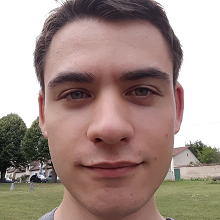Aurélien de la Chapelle (PAM)
Aurélien de la Chapelle (PAM)

Dear all,
I'm pleased to invite you to my PhD defense, entitled "Toward a better understanding of dreaming - Electrophysiological and behavioural investigations", that I conducted under the supervision of Perrine Ruby and Laure Peter-Derex in the Perception, Attention, Memory (PAM) team of the CRNL.
The defense will take place on Tuesday, December 19th at 2:00 pm, in English, in the amphitheater of the Neurocampus Michel Jouvet (95 Boulevard Pinel, 69500 Bron), before the jury composed of :
- Dr. Géraldine Rauchs (reviewer, DR Caen)
- Pr. Manuel Schabus (reviewer, PU Salzburg)
- Dr. Lampros Perogamvros (examiner, PD Genève)
- Pr. Stéphanie Mazza (examiner, PU Lyon)
- Pr. Laure Peter-Derex (PhD supervisor, PU-PH Lyon)
- Dr. Perrine Ruby (PhD supervisor, CR Lyon)
Please find attached a summary of my thesis.
The defense can also be attended remotely with this link.
Best regards,
Aurélien de la Chapelle
Abstract
People from every era have found dreams to be a source of fascination, leading to many hypotheses about their meaning and interpretation. And while curiosity generally leads to answers, much remains to be understood about dreaming, notably because of its subjective and fleeting nature. Throughout this thesis, we confronted these challenges by using varied methodologies, allowing us to investigate several unanswered questions about dreaming. We first tested the contribution of cognitive abilities to dream recall frequency (DRF) in a thorough investigation of memory and attention (using the MEMAT paradigm) in low- and high-frequency dream recallers (respectively LR and HR), both at the behavioural scale (Study 1a) and with MEG recordings (Studies 1b, 1c). Then, we capitalised on the study of epilepsy, a condition associated with abnormal brain activity generally activated by sleep, to investigate the neural bases of dream content and dream recall thanks to intracranial recordings (Study 2a, 2b). Finally, we investigated the content and frequency of grief-related dreams during the first year of mourning after the death of a relative to test the emotion regulation hypothesis of dreaming (Study 3).
Memory performance and its cerebral correlates did not differ between LR and HR in the MEMAT task, supporting the hypothesis that short-term memory abilities during wakefulness are not a determinant factor of DRF. In addition, the MEMAT paradigm enabled us to confirm attention-related cerebral differences between LR and HR and to show for the first time attentional performance differences between LR and HR. Attentional processes may modulate DRF via the promotion of intra-sleep wakefulness (bottom-up attention) and/or by orienting the focus of attention toward the dream content (top-down attention). According to the preliminary results of the Studies 2a and 2b, intrasleep wakefulness is associated with DRF in epileptic patients as is the case in healthy subjects. Notably, the increased rate of nocturnal awakenings due to epilepsy seems to increase DRF in this population. Finally, the results of the Study 3 suggest that dreaming is strongly influenced by emotion regulation processes. We indeed observed a correlation at the within-subject level between grief intensity (as assessed by the Inventory of Complicated Grief scale) and the frequency of grief-related dreams. The mourning process evolves all the more favourably that grief-related dreams are recalled often and integrate positive emotions. As such, the brain activity underlying emotion regulation during sleep seems to influence the dream experience. As a conclusion, the broad investigations we conducted using rare methodologies offer a new perspective on the landscape of dream research, which we hope will one day contribute to a comprehensive understanding of dreaming.
Keywords: Dream, sleep, emotion regulation, memory, attention, epilepsy, behaviour, MEG, SEEG
CRNL | CH Le Vinatier | Bâtiment 462 Neurocampus Michel Jouvet | Amphithéâtre | 95 Boulevard Pinel | 69500 Bron











